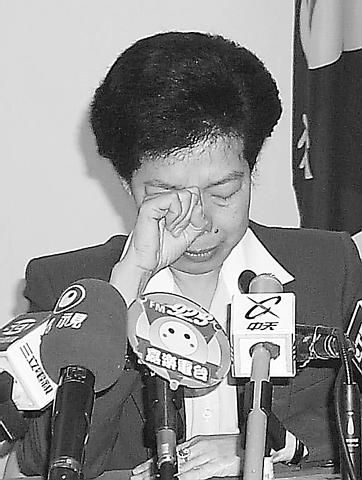Chiayi Mayor Chang Po-ya yesterday finally made official her acceptance of President-elect Chen Shui-Bian's (陳水扁) invitation to take up the post of Minister of the Interior, while serving concurrently as provincial chairperson.
Shedding tears during her announcement at the Chiayi City Hall yesterday, the incumbent mayor of the southern city said she was reluctant to leave the people in her hometown.
Chang said she had made the decision with a heavy heart, rather than with joy. She also said that the central government should not be superior to and aloof from local administration and people.

PHOTO: TSAI TSONG-HSUEN, LIBERTY TIMES
"This is an important factor for me in taking the post," she said.
"I hope that the opinions and needs of local communities can be brought to the central government, and that central authorities can pay serious attention to local development and construction. These situations are the same no matter where you are in Taiwan," Chang said.
Chang has served at Cabinet level before being the director-general of the Department of Health from 1990 to 1997, during which time she oversaw the difficult introduction of the National Health Insurance scheme.
Chang has served as mayor of Chiayi during three separate terms. First elected in 1983, Chang succeeding her mother, Hsu Shih-hsian (許世賢), after she died. She was re-elected once again in 1985, and then in 1997.
During those terms, her sister, current Taichung Mayor Chang Wen-ying (張文英), also served two terms.
In fact, the Chang family's political influence and popularity in Chiayi City have long been unrivalled.
Since Chang has served just over half of her four-year term as mayor,an acting mayor will be appointed by the central government to serve the rest of Chang's term which ends in 2001.
"It won't be my sister, though," Chang Po-ya said, smiling.
The search for a new Minister of the Interior after Chen's election has not been easy. Last week, Chen proposed that Chang take the post, and after what appeared to be great reluctance on her part, Chen paid a visit to Chiayi on Sunday to persuade her to change her mind.
In related news, Chen reportedly met last night with national security advisor Chien You-hsin (簡又新), who confirmed that Chen had asked him to serve as vice secretary-general of the Presidential Office.
Chien said he had yet to consider the offer, however, and that he had not made a decision on the matter.
Also, the appointment of Minister of Education remains undecided. Ovid Tzeng (曾志朗), president of National Yang Ming University, who has been named as a candidate, was not willing to make a firm commitment yesterday.

CHAOS: Iranians took to the streets playing celebratory music after reports of Khamenei’s death on Saturday, while mourners also gathered in Tehran yesterday Iranian Supreme Leader Ayatollah Ali Khamenei was killed in a major attack on Iran launched by Israel and the US, throwing the future of the Islamic republic into doubt and raising the risk of regional instability. Iranian state television and the state-run IRNA news agency announced the 86-year-old’s death early yesterday. US President Donald Trump said it gave Iranians their “greatest chance” to “take back” their country. The announcements came after a joint US and Israeli aerial bombardment that targeted Iranian military and governmental sites. Trump said the “heavy and pinpoint bombing” would continue through the week or as long

TRUST: The KMT said it respected the US’ timing and considerations, and hoped it would continue to honor its commitments to helping Taiwan bolster its defenses and deterrence US President Donald Trump is delaying a multibillion-dollar arms sale to Taiwan to ensure his visit to Beijing is successful, a New York Times report said. The weapons sales package has stalled in the US Department of State, the report said, citing US officials it did not identify. The White House has told agencies not to push forward ahead of Trump’s meeting with Chinese President Xi Jinping (習近平), it said. The two last month held a phone call to discuss trade and geopolitical flashpoints ahead of the summit. Xi raised the Taiwan issue and urged the US to handle arms sales to

State-run CPC Corp, Taiwan (CPC, 台灣中油) yesterday said that it had confirmed on Saturday night with its liquefied natural gas (LNG) and crude oil suppliers that shipments are proceeding as scheduled and that domestic supplies remain unaffected. The CPC yesterday announced the gasoline and diesel prices will rise by NT$0.2 and NT$0.4 per liter, respectively, starting Monday, citing Middle East tensions and blizzards in the eastern United States. CPC also iterated it has been reducing the proportion of crude oil imports from the Middle East and diversifying its supply sources in the past few years in response to geopolitical risks, expanding

Pro-democracy media tycoon Jimmy Lai’s (黎智英) fraud conviction and prison sentence were yesterday overturned by a Hong Kong court, in a surprise legal decision that comes soon after Lai was jailed for 20 years on a separate national security charge. Judges Jeremy Poon (潘兆初), Anthea Pang (彭寶琴) and Derek Pang (彭偉昌) said in the judgement that they allowed the appeal from Lai, and another defendant in the case, to proceed, as a lower court judge had “erred.” “The Court of Appeal gave them leave to appeal against their conviction, allowed their appeals, quashed the convictions and set aside the sentences,” the judges